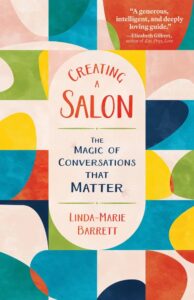
Why Everyone—Yes, Everyone—Should Join a Book Club
Linda-Marie Barrett on the Pleasures of Reading in Community
“Books are something social—a writer speaking to a reader—so I think making the reading of a book the center of a social event, the meeting of a book club, is a brilliant idea.”
–Yann Martel
*
Our country is experiencing a loneliness epidemic. From the US surgeon general’s 2023 report Our Epidemic of Loneliness and Isolation:
Social connection is as essential to our long-term survival as food and water. But today, loneliness is more widespread than other major health issues in the US. Our epidemic of loneliness and isolation is a major public health concern.
Changing patterns in how we work, play, and gather, including an overreliance on social media as a substitute for community, increase our isolation from one another. Younger generations are reportedly less likely to socialize in person and less likely to enjoy, let alone voluntarily engage in, unscripted, spontaneous conversation. It’s clear we are deeply affected by the quality and frequency of human connections, but we’re trending in the wrong direction.
If you, too, yearn for a way out of the despair and disconnection that is the zeitgeist of our time, let me suggest a tried and true remedy: join a book club.
I get the tendency to isolate. When I’m stressed, which is a lot lately, defaulting to jammies and the newest favorite series on Netflix is appealing. But it can hurt my spirit to insulate at the expense of socializing. I’ve learned that the best salve for me is not retreating, but being in community, in a shared space, having meaningful conversation; that is the essence of who I am, and how I find peacefulness within myself.
If you, too, yearn for a way out of the despair and disconnection that is the zeitgeist of our time, let me suggest a tried and true remedy: join a book club. It’s not a panacea for all that ails us, but it’s a simple way to connect over ideas wrapped in beautiful passages that crystallize something we’ve felt, longed for, worried about, feared, or wanted to speak aloud to others. The journey to finding the bookclub that works for you can be like going on a few blind dates before you find your match, but once you do, you might discover a new group of friends you can look forward to seeing regularly. If you don’t find a club with a focus you like, start your own. That’s what I did.
I’ve hosted book clubs for over two decades, beginning with one named “All Romance All the Time” (ARAT), where we explored romance through different genres—sci-fi, mystery, young adult, fantasy, historical fiction, and more. At the time, I co-owned and managed an independent bookstore. Reading romances was a guilty pleasure many customers chose to keep closeted.
Our store didn’t have a romance section (yet!), and I noticed that often when a customer would order a romance, it was on behalf of someone else—an elderly aunt, their mother, the neighbor to whom they owed a favor, a sick friend. I could tell when I asked about their “friend’s” favorite authors and kinds of romances (Enemies to lovers? Love triangle? Historical? Paranormal? Spicy? Time travel?) that the novels were actually for them. I revealed my unabashed love of the genre, and they usually came clean that they loved it, too. Soon we’d be recommending our favorite authors to each other.
My experiences hosting my book club gave me the confidence to go a step further in expanding my friend circle by hosting salons.
Eventually several of us decided to formalize our fandom into the ARAT book club. We shared a lot of laughs, swoony sighs, and eye rolls when we met each month to discuss our chosen book. After exhausting ourselves upon the rocks of Fifty Shades of Grey, the most unpopular and, as it turned out, final romance for our club, we decided to move on from the genre to a broader focus. We morphed into our current “Women in Lively Discussion,” aka WILD, where we discuss fiction and nonfiction by women (cis and trans) and non-binary writers, and read the occasional romance because I’m still a booster of the genre.
Over the years, the WILD book club has expanded to well over a hundred members. The core group, the regulars, range in age from twenty to seventy and up. Over countless glasses of wine and cups of tea, through conversations that grew out of book discussions or happened in the moments before we started them, we’ve learned about each other’s childhoods, families, regrets, triumphs, health issues, and marriage challenges. When the pandemic kept us from meeting in person, we met on Zoom.
Having survived that dreadful experience together, and laughing at the irony of discussing Station Eleven by Emily St. John Mandel two months into Covid (we’d chosen it the year before), we emerged a tighter group. We may not all be besties, but we’ve formed a special bookish community that we look forward to reentering each month.
Being a member of a book club is a commitment, it’s true. Our time is precious, and devoting a good number of hours to reading the book club selection is no casual thing, especially when it turns out you’re not keen on the monthly pick. Still, it’s often those books that don’t please everyone that yield the best conversations. And expressing your thoughts on the book? That’s also a big deal. It can be scary to voice opinions about a book’s content and quality of writing in front of others, especially if you don’t come from a background where this is a common thing to do, or you’re a shy person, or both. Will you be judged? Is it excruciating to admit you hated the book when everyone else is saying they loved it, or vice versa? Do you have fear around speaking in front of a group? So much to consider!
That’s part of the fun of book clubs, discovering differences in tastes.
But in that discomfort lies the opportunity to grow. By taking the brave leap of participating in challenging conversations, we allow ourselves to be seen more truly and honestly; we may even become better listeners, too, and gain compassion for differing opinions. In these moments we form the relationships that will counter our loneliness and build our community. My experiences hosting my book club gave me the confidence to go a step further in expanding my friend circle by hosting salons.
If you’re not the host, you have more latitude to only join those meetings when the book interests you, and to engage to the extent you feel comfortable. My book club membership is huge, but less than twenty members show up for our meetings. We don’t all love every book choice, though everyone adored a recent read, Ursula Parrott’s Ex Wife. That’s part of the fun of book clubs, discovering differences in tastes: who is the literary snob, who is up for a good story however well or clumsily told, who prefers to listen to their books, who likes the written word, who does both!
If you need more nudging on why starting or joining a book club might be the best thing you do for yourself this year, let me give you ten more good reasons.
Book clubs:
1. Bring folks together for positive, non crisis-driven reasons.
2. Encourage introverts and extroverts to find their inner ambivert by sharing space in a discussion.
3. Create empathy by emotionally transporting us into the experiences of others.
4. Are a low-cost opportunity to travel the world through books.
5. Can be a great excuse to see friends and make new friends.
6. Expand our horizons. Books act as mirrors, windows, and sliding glass doors.
7. Connect us with authors in person, on zoom, and on the page.
8. Are alternatively escapist or educational, depending on the club’s goals.
9. Inspire us to be in multigenerational spaces.
10. Build community.
If you need help finding or hosting a book club, check in with your local bookstore or library. They are your people and will happily be your guides. And remember, like so many great things in life, it all begins with a book.
__________________________________

Creating a Salon: The Magic of Conversations That Matter by Linda-Marie Barrett is available from Agate Surrey.
Linda-Marie Barrett
Linda-Marie Barrett is a writer, editor, and steward of a whimsical garden guarded by gnomes. She has a BA in Russian Studies from Colgate University, and an MA in Russian Literature and Slavic Linguistics from Cornell University, where she received a National Resource Fellowship and an Olin Fellowship. She is the executive director of the Southern Independent Booksellers Alliance (SIBA). From 1988-2017, she worked at Malaprop’s Bookstore/Cafe, where she wore many hats, including author events manager, general manager, and co-owner. She edited and contributed to the regional bestselling serial novel Naked Came the Leaf Peeper, called “a blur, a buzz, a local-grown tall tale, and an absolute delight” by Elizabeth Gilbert, author of Eat Pray Love. She is a contributor to Spinning Toward the Sun: Essays on Writing, Resilience, and the Creative Life, an anthology benefitting the recovery of Asheville, NC after Hurricane Helene. She writes a blog with her sister, Diane Barrett Tien, Barrett-Sisters.com where they share about life’s curveballs and rewards. She has been hosting her Black Swan Salon since 2017 and has no plans to ever stop. She lives with her husband, writer and blogger Jon Mayes, in Asheville, North Carolina.



















